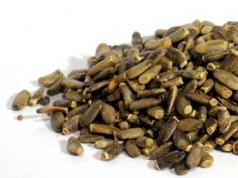There is an old joke that the only thing worse than a toothache is a toothache. This is true. This is due to the fact that source pain, although small, is in close proximity to a cluster of nerves.
In addition, according to statistics, pain can increase significantly at night. Today we will try to find out why do teeth start to hurt much worse at night and how to deal with it.
What causes pain?
First of all, you should know what dental diseases cause toothache.
- Caries. Enamel and dentin are damaged, and pathogenic microorganisms actively develop in the carious cavity itself.
With deep damage, the cavity extends almost to the pulp, which contains nerve endings. Pain occurs under the influence of irritants and disappears after the source is eliminated.
- Pulpitis. A complication of caries is characterized by damage to the pulp itself, in which an inflammatory process develops and nerve endings are affected. Pain often occurs for no apparent reason.
- Flux. This is extremely dangerous complication untreated pulpitis, in which there is an inflammatory process in the jaw bone and periosteum.
- Non-carious damage to the enamel and hard layers of the tooth. Due to the blows strong manifestations Bruxism, luxation and some other factors can also damage the tooth. The cause of pain is the same as with the listed diseases.
- Periodontitis. Inflammation in the tissues surrounding the top of the tooth.
- After filling. An incorrectly performed procedure, when the procedure was not followed accurately or errors occurred during the filling process, is also a cause.
- After removal. Painful sensations, more strong at night may be caused by the fact that during the process of tooth extraction, some of its parts located under the gum, for example, a fragment of the root, were missed.
Reasons for increased intensity at night
Many people believe that increased pain in the dark is not true.
However, this phenomenon actually exists and has quite specific reasons, and not only physical, but also psychological.
All they equally contribute to an increase in pain and have been sufficiently conclusively identified and described by doctors - dentists, physiologists, and also psychologists.
Physiological
First of all, you should consider those factors that provoke increased night pain from a physiological point of view.

First of all, the reason may be the horizontal position of the body that a person assumes during sleep. Blood flows more to the head, in particular to the jaws, increasing pressure on inflamed tissues and nerve endings in diseased teeth.
It should be noted here that This is not typical for all dental diseases..
Most often, acute, unbearable pain at night is caused by pulpitis. At this time, excess pressure is created in the inflamed pulp due to the blood flow to it, which affects the supply nerve bundle signals to the central nervous system, enhancing them.
In addition to acute and chronic (in the acute stage) forms of pulpitis, for which increased toothache at night is one of the characteristic symptoms, this list also includes exacerbations chronic periodontitis and periodontitis.
Do you doubt it? More on this in our next article.
We will tell you how to rinse your mouth after tooth extraction in a separate article. Tips for use folk remedies.
Change can be classified as a separate group general condition body:
- The time interval from 12 o'clock at night to approximately 5 o'clock in the morning is considered the most difficult and difficult for the whole organism.
It was at this time susceptibility increases many times over human body to any diseases, including dental.
- Physiologists say that Vagus reigns at night. This is another name for the vagus nerve, which has many branches, including in the head area. Vagus affects good mood, well-being and much more.
At night, its tone changes, which is the main indicator, therefore sensitivity increases and general reaction for pain.
- Also, according to the biorhythms of the body, at night, blood pressure usually rises even in healthy people. This also provokes an increase in toothache, even if the person has not yet gone to bed, that is, has not taken a horizontal position.

Sometimes pain mistaken for a toothache can be caused by completely different diseases:
- Inflammation of the tertiary nerve can cause pain in the jaw that worsens at night. By virtue of various reasons the nerve may become irritated or pinched, producing a sensation that can easily be mistaken for a dental problem.
- If the pain is not concentrated in the area of one tooth, but spreads throughout the entire jaw, then this may indicate and even about some ENT diseases.
The most common include sinusitis, otitis and sinusitis. After all, in horizontal position the outflow of fluid from the sinuses becomes difficult, which intensifies the pain and spreads it to the entire jaw.
It is especially difficult to determine the source of pain in children, because Small child may complain of a toothache, when in fact his ear hurts.
It should be added that symptoms almost identical to toothache can occur at night due to seemingly completely unrelated problems with dentistry.
It could be severe exhaustion. nervous system, chronic lack of sleep, as well as excessive smoking and consumption of caffeinated drinks.
Psychological
During the day, everyone has a lot of worries - work, travel, family and household chores, and often there is no way to focus on the pain that bothers you.
The body reacts to this in a unique way - it relieves pain without allowing it to come to the fore. Thus, it allows a person to calmly go about his business.
In addition, during the day we are tense and active, we simply have no time to think about any problems with our teeth - there is no time for that. In the evening, coming home from work or simply completing all urgent matters, a person relaxes.
That’s when signals from nerve endings come to the fore, demanding an immediate solution to the existing problem. The body, having relaxed, simply cannot resist them.
Treatment and first aid
It should be noted right away that treatment should be carried out only and exclusively by a specialist. Self-medication is possible only in rare cases, for example, when the patient is on a business trip where there is no dental clinics, offices and even a regular clinic.
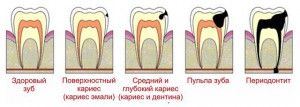
As soon as the opportunity arises, you should still visit the dentist. Otherwise, the disease may temporarily “subside”, but continue to develop, which will lead to its complications and the emergence of even greater problems.
Concerning first aid for severe toothache at night - using it is not only possible, but also necessary. There are many means and methods for this.
 How much time ? What to pay attention to if pain occurs?
How much time ? What to pay attention to if pain occurs?
In a separate section we will talk about characteristic symptoms that the child is cutting his upper or lower teeth.
Taking painkillers
What to do and where to go if your tooth hurts badly at night and you can’t get to the dentist? Most often in such situations it is recommended to use effective medicines, freely sold in pharmacies. Many of them can be found in your home medicine cabinet.
- Analgin, as well as its analogues - pentalgin, tempalgin, tetralgin and others.
- Aspirin. It's better to use it in the form effervescent tablets, which act much faster.
- Ibuprofen. Very important factor– the medicine can be used for pain relief in children.
- Paracetamol with analogues.
- Ketorol or ketanov. It should be used with extreme caution, as the drug is very strong and has many contraindications and side effects.
Sometimes these medications are taken not as indicated in the instructions, that is, orally, but locally.
This method does not involve a system-wide effect, but a localized local one, however, it is recommended to use it only in cases where the causative tooth is accurately determined.
Can use several options:
- crush the tablet into powder, which you then sprinkle on the visible tooth defect;
- prepare a solution for injection of one of the painkillers and treat with a cotton swab soft fabrics in the place where painful sensations appear.
Local remedies

For local processing you can use special dental drops. Additionally, they use various ointments and gels intended for pain relief in dental diseases.
Such remedies help alleviate the condition if a wisdom tooth hurts at night or when a child’s first incisors erupt.
Among them:
- Metrogyl denta;
- Dental;
- Solcoseryl;
- Asepta;
- Kholisal and others.
Antibiotics
These drugs are widely used in dentistry to combat inflammatory processes. However, they should not be taken without consulting your doctor.
A single dose of an antibiotic is not able to relieve toothache immediately; this is possible only after a whole course. Therefore, only those patients who do not have the opportunity to see a specialist due to his absence (for example, a business trip) can take antibiotics on their own.
What remedies will help you quickly relieve pain, watch the video:
Solutions and decoctions for rinsing
Gargling with decoctions medicinal herbs, which are sold in pharmacies, as well as their combinations, also help well:
- mint;
- sage;
- chamomile;
- Melissa.
Traditional methods
![]()
The list of folk remedies for quickly relieving toothache is quite extensive:
- Already mentioned above medicinal plants – they are also used in folk medicine.
- In addition to them, you can use crushed garlic, which is applied to the problem area or placed directly into the carious cavity.
- Still good plantain and regular white cabbage. You should take a large sheet and apply it to the outside of your cheek.
- The pain decreases if you apply it to the cheek on the problematic side. piece of ice, which will reduce the overall sensitivity of nerve endings.
- The mouth can be rinsed vodka or diluted alcohol, after holding the liquid in your mouth for several minutes without swallowing.
Whatever causes severe tooth pain at night, You should contact your dentist as soon as possible.
The specialist will either find out the exact cause and carry out/prescribe treatment, or refer you to a doctor of another specialty if diseases of other organs are detected.
If you find an error, please highlight a piece of text and click Ctrl+Enter.
Why do my teeth hurt especially bad at night? The activity of the human nervous system is designed in such a way that during the day all ailments fade into the background, because there are more important “stimulants”: work, household chores, communication with relatives and friends... And when it’s time to sleep at night, the body completely relaxes, thoughts calm down and pain becomes more pronounced.
It can be different in nature: aching, paroxysmal, acute, “shooting”, but, in any case, depriving sleep. If the tooth is significantly affected and the bottom of the cavity with caries is located next to the pulp, then the pain is felt as aching. With absence effective treatment, the destruction process will not stop and inflammation will develop. In this case, the pain will become paroxysmal, shooting, radiating to the eye, head, ear. At the next stage, the pathological process will move to the tooth root - constant pain, intensifying with mechanical pressure. The tooth becomes mobile and the tissues surrounding it become inflamed.
Pulpitis and its symptoms
Why does the tooth hurt so much only at night? Night toothache is one of the main causes of inflammation of a bundle of nerve fibers and blood vessels. The common name among patients for this bundle is “nerve”; doctors call it pulp. The most common cause of pulpitis is caries. With this disease, hard dental tissues are damaged very deeply and the pathogenic microflora living in the cavity with caries provokes inflammation of the pulp.
And yet, sometimes pulpitis is the result of incorrect actions by the dentist, when bacteria enter the tooth cavity and cause inflammation. Even less commonly, a tooth becomes infected through blood vessels or as a result of injury.
This disease can be identified by a number of common symptoms:
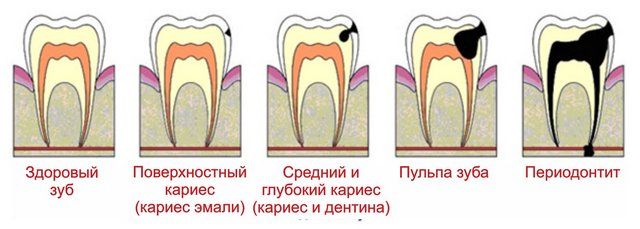
Depending on the nature of the course, pulpitis can be acute or chronic. Each form is characterized by certain symptoms.
Has the following manifestations:

With absence timely treatment The acute form of the disease becomes chronic. In this case, the following are observed:
- increased pain in the tooth when eating hot food and drinks;
- reduction of pain from cool food and drinks, from cold compresses;
- fetid odor of rotting breath.
Pain with pulpitis is more pronounced than with carious lesions of teeth. It can intensify when exposed to various irritants: temperature, chemical or mechanical. After eliminating the irritant, the pain does not go away for a long time. Pain is caused by biting moderately hard food (bread, boiled vegetables), brushing teeth, inhaling cold air, drinking hot tea, visiting a sauna, etc.
It must be remembered that the exact differential diagnosis can only be performed by a doctor. Often the symptoms of pulpitis are similar to diseases such as periodontitis, neuralgia, etc. Before seeing a doctor, you can only numb the tooth by taking, for example, Ketanov, Spazmolgon, Nise.
Diagnostic procedures
Pulpitis is diagnosed based on patient complaints ( subjective symptoms), as well as on medical examination(objective symptoms). Diagnostics includes the following procedures:
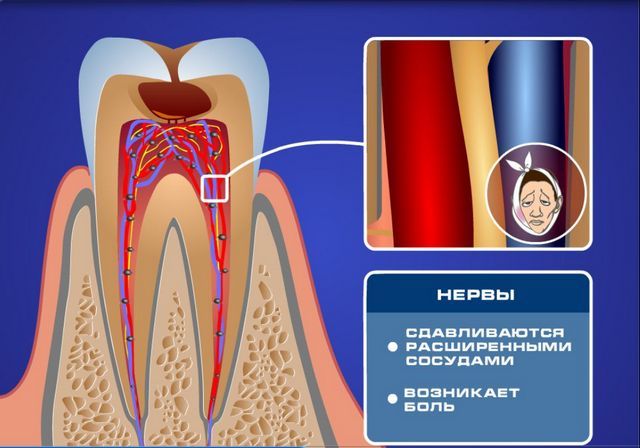
Healing procedures
In case of pulpitis, when the tooth hurts mainly at night, you need to consult a doctor as soon as possible. When identifying acute form disease, the dentist may use a biological method of treatment. It consists in the fact that the tooth is preserved along with the nerve. Calcium-containing preparations in combination with physiotherapeutic procedures relieve inflammation in the pulp and stimulate the production of new dentin. The cavity with caries is filled.
 In case of more late treatment behind medical care possibility of use biological method may be missed. Then partial pulp removal is used. During the procedure, under anesthesia, only a part of the neurovascular bundle located at the same level as the crown is removed. The root remains intact and the tooth remains viable. The next step is to apply a calcium-containing preparation, and the cavity with caries is filled. Physiotherapeutic procedures and anti-inflammatory medications may also be prescribed. This method of treatment is especially effective in children, when the tips of the roots are not yet fully formed.
In case of more late treatment behind medical care possibility of use biological method may be missed. Then partial pulp removal is used. During the procedure, under anesthesia, only a part of the neurovascular bundle located at the same level as the crown is removed. The root remains intact and the tooth remains viable. The next step is to apply a calcium-containing preparation, and the cavity with caries is filled. Physiotherapeutic procedures and anti-inflammatory medications may also be prescribed. This method of treatment is especially effective in children, when the tips of the roots are not yet fully formed.
Unfortunately, in most cases of pulpitis, the only treatment method is complete removal"nerve". After this, an endodontic treatment method is used, in which the dental canals and tooth are completely filled.
X-rays are done to monitor the quality of root canal filling. When the canals are filled to the tops, the cavity is filled.
When the tooth is significantly damaged, a pin stump is inserted. After this, the tooth is held on a pin
If sharp pain caught up in a situation where it is not possible to get an appointment with a doctor, you can use painkillers, for example, Ibuprofen, Paracetamol. Effectively and quickly relieves pain 2% solution Acetylsalicylic acid or Amidopyrine. It needs to be dripped into the caries cavity.
If these remedies do not help, you should resort to stronger painkillers, such as Ketanov or Atkasulide. But we must not forget about adverse reactions and contraindications to these drugs.
Traditional methods of treatment
Traditional medicine offers great amount recipes that help at night. Here are some of them:

Why do my teeth hurt at night? This question interests many. People often notice that discomfort worsen at night, deprive you of peace and make it impossible to sleep. This article will tell you what diseases cause this insidious symptom, who to turn to for help, and how to wait for a visit to the doctor.
Severe toothaches at night indicate development in the body inflammatory process. To get rid of the pathology, you need to visit the dentist, establish a diagnosis and carry out treatment.
A symptom may indicate the development of one of the diseases:
- Deep caries. Pathology develops due to violation of personal hygiene rules. If a person does not brush his teeth after eating, microscopic food particles remain in the mouth. They are a favorable environment for activation pathogenic microflora. The waste products of caries gene microbes contribute to the softening of the enamel. Primary damage to dental tissue is a process that occurs at the microscopic level. The patient does not notice any changes, there are no unpleasant sensations. Visually, you can notice the formation of white chalky spots on the enamel.
Secondary causes of caries development are: vitamin deficiency, somatic diseases, hereditary predisposition.
Medium and deep caries is accompanied by destruction of enamel and dentin. A cavity appears in the crown with dark edges.
Initially, unpleasant sensations appear during eating. Product particles clog into the cavity and have a negative effect on the pulp. When eating sour, salty, sweet, hot foods, aching pain in the tooth. An unpleasant symptom may appear at night. In most cases, it is observed if a person does not spend time before going to bed. hygienic cleaning oral cavity. Pain that worsens mainly at night indicates the rapid development of pulpitis;
- Pulpitis is inflammation of the nerve inside the roots. The disease is the main culprit that causes tooth pain in the evening and at night. Negative feelings during illness are so strong that they deprive a person of sleep.
Reasons for the development of pulpitis: caries, violation of hygiene rules, vitamin deficiency, chronic diseases ENT organs. Pulpitis can appear spontaneously as a result of a jaw injury.
If the pathology is caused by caries, then visually there is a cavity on the crown with dark edges. Its size varies depending on the degree of damage to the enamel and dentin.
Pain with pulpitis usually does not depend on external signs, the sensations do not become more pronounced after touching or biting on a tooth. A feature of the disease is increased pain at night. Many patients notice that the symptom is more severe after dark and in the morning its severity weakens.
It is impossible to establish an accurate diagnosis and carry out treatment at home for diseases of the oral cavity. To solve the problem, visit an experienced dentist.
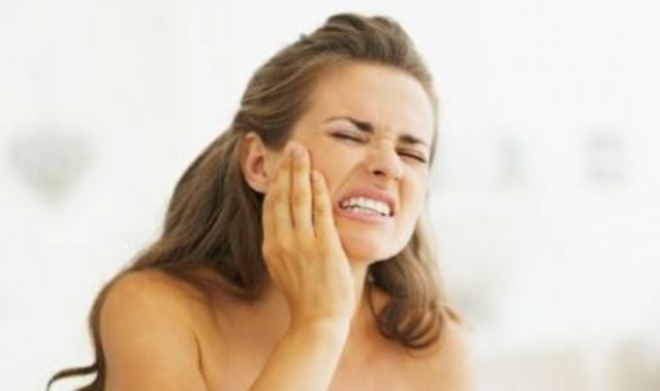
It has been noticed that pain always increases at night, since a person is at rest, is not distracted by other factors and completely focuses on his well-being. If you cannot sleep due to tooth pain, this may be due to:
- Periodontitis is an inflammatory process in periodontal tissues. Reasons for the development of pathology: poor treatment of caries, pulpitis, jaw injury. Associated factors: hypothermia, infections of the upper respiratory tract. The pain associated with periodontitis is constant, aching, and worsens when you touch the affected tooth.
- Periostitis is inflammation in the periosteum. Causes of the disease: poor quality treatment of caries, pulpitis, periodontitis, diseases of the ENT organs, inflammation of the gums. Symptoms: formation of lumps at the roots, hyperemia of the gums, discomfort when touching and biting. For more late stages The development of flux is accompanied by an increase in temperature, a decrease in general well-being, swelling of the tissues of the cheeks, lips, neck, and facial asymmetry.
- Periodontitis, gingivitis - inflammation of the gums, accompanied by bleeding, hyperemia of the mucous membranes, unpleasant smell from the mouth, pain in the jaw.
- Eruption of wisdom teeth.
- Neurological diseases (neuralgia, neuritis trigeminal nerve, phantom pain). If a neurotic disease is confirmed, contact a neurologist.
- Stomatitis.
A person must understand that depending on the cause of the disease, treatment will vary. You should not make diagnoses on your own and try to cope with the pathology. Self-medication can lead to dangerous complications.
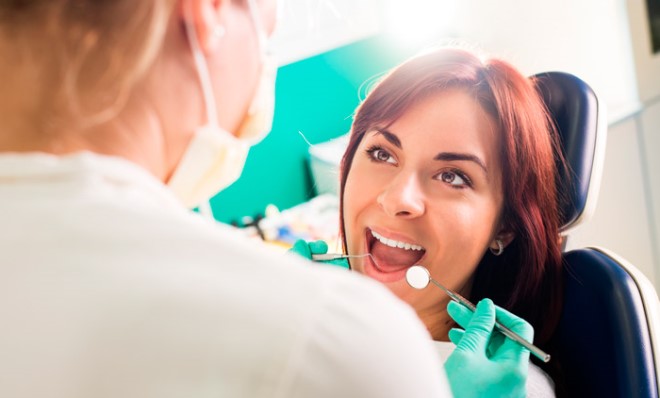
During your visit to the clinic, the doctor will examine the oral cavity and, if necessary, prescribe additional methods examinations. X-ray will show the degree of tissue damage, the presence of an inflammatory focus in the tissues of the pulp and periodontium.
Treatment of deep caries and pulpitis is identical. Stages of a doctor’s work:
- Pain relief with an anesthetic;
- Elimination of affected tissues;
- Pulp devitalization in the treatment of multi-rooted teeth
- Expansion, cleansing, treatment of channels;
- Sealing cavities with gutta-percha and filling paste;
- Carrying out a control x-ray;
- Crown restoration using a composite is carried out 2–3 days after the canal filling stage.
After treatment of pulpitis and deep caries, the patient may experience minor discomfort in the jaw for 5–10 days. Over time, the pain becomes less noticeable and disappears completely.
With periodontitis and periostitis, the dentist’s task is to eliminate the source of infection. To do this, it is necessary to clean the root canals and thoroughly treat them. Therapy for flux and periodontitis is most often long-term. To eliminate the inflammatory process, a person must carry out therapeutic rinses. After the source of infection has been eliminated, the canals are filled and the crown is restored.
If necessary, use to treat flux surgical methods. If a man long time does not go to the dentist, the likelihood of saving the dental unit is significantly reduced.
If acute toothache is caused by the eruption of the figure eight, you need to contact a dental surgeon. After the examination and X-ray, the doctor will tell you about methods to solve the problem.
The doctor begins manipulations that may be accompanied by unpleasant sensations only after administration local anesthesia. Modern painkillers are highly effective, are not absorbed into the blood, and are well tolerated by patients.
First aid

What to do if your tooth hurts at night?
You can try to help yourself. It is important to remember that the actions are symptomatic and not therapeutic. They will help relieve discomfort, but will not cure the pathology.
Methods to get rid of night pain:
| Painkillers. | They are the most convenient and reliable way. Nise, Analgin, Tempalgin, Ketanov, Ketarol - drugs that eliminate unpleasant symptoms, alleviating the human condition. It must be remembered that medications are used according to age restrictions and in compliance with strict dosages. If after taking the pill, the condition does not improve, it is prohibited to use other types of analgesics or increase the dosage of the drug already taken. Overdose medicinal substances causes damage to the liver, kidneys, brain and is fraught with sad complications. If a child or a pregnant or lactating woman has a severe toothache, you can use Paracetamol, Ibuprofen |
| Gargling with medicinal herbs and flowers. | Chamomile, plantain, calamus root, calendula, oak bark, sage - have healing properties, have an antiseptic and anti-inflammatory effect. Infusions and decoctions are prepared in a water bath or in a thermos. You should not use rinses if a person is not sure that he is not allergic to medicinal plants. |
| Rinsing with baking soda and salt | The method is a reliable and proven tool. Using the method does not cause negative reactions in the body and does not lead to allergic reactions. To prepare a useful solution you need to take 200 ml of warm boiled water, pour 1 teaspoon of salt and soda into it, stir. Rinsing is carried out 5-6 times a day. The healing solution helps eliminate pain and makes you feel better. |
If a person’s body temperature rises and tissue swelling appears, this indicates the spread of the inflammatory process. In this case, it is necessary to visit the dentist as soon as possible.
Conclusion
Toothaches at night cause a lot of suffering and prevent you from sleeping peacefully. As a result, in the morning a person feels tired and overwhelmed. You should not endure unpleasant sensations for a long time, as they will become stronger every day.
After treatment by a dentist takes place, you must follow a number of simple rules:
- Carry out hygienic treatment of the oral cavity 2 times a day using a paste and a brush. Floss, irrigator, rinses are an important addition to daily hygiene.
- Eat properly. Reduce the amount of sweets you consume and give up carbonated drinks. Pamper your body more often delicious fruits, vegetables, herbs;
- Stop smoking and alcohol. Nicotine is the enemy of the body. People who smoke have dark, pigmented plaque on their teeth, which leads to the development of gingivitis and periodontitis. Alcoholic drinks reduce the body’s protective properties and lead to degeneration of the mucous membranes;
- Try to avoid hypothermia. Dentists have noticed that diseases such as pulpitis, periodontitis, periostitis most often appear during or after viral infections;
- Increase protective functions body - go in for sports, hardening;
- Visit your dentist for preventative purposes.
Did you know that it is not the notorious law of meanness that is to blame for the occurrence of toothache at night, but processes that are completely explainable from a physiological point of view? Yes, yes, in the late afternoon and at night the pain can really get worse, and self-hypnosis has nothing to do with it. Why do your teeth hurt at night, what is the reason for this and how to “survive until the morning”, you will learn from our article.
Why do teeth ache at night?
Toothache gets worse at night for a number of reasons. Firstly, the “provocateur” of severe toothache is often. This disease develops when the dental nerve, the pulp, becomes inflamed. The inflammatory process is preceded by damage to the tooth and destruction of its hard tissues by caries.
Secondly, in the human body, the course of inflammatory processes is controlled by the adrenal glands. During the daytime, they actively secrete corticosteroids - hormones that reduce the intensity of pain and suppress inflammation. By evening, the activity of the adrenal glands decreases, and the process of their production of hormones stops. This becomes the main reason explaining the increase in pain at night. By the morning, the adrenal glands “turn on” again, the process of producing corticosteroids starts, and the pain can be “removed as if by hand.” But you should understand that without treatment, toothache will recur at night, and this scenario will be repeated a certain number of times, until the disease completely destroys the tooth and provokes the development of dangerous complications.
Important: delaying a visit to the doctor is unsafe for your health, even if you feel better the next morning.
Thirdly, an important role in increasing pain at night is played by the fact that during the day a person is busy with various everyday activities and listens less to his feelings. Work, household chores, and meetings act as distractions. In the evening, in a calm home environment, a person concentrates more strongly on the pain, and it seems more intense.
Increased toothache at night is not self-hypnosis, but an explainable phenomenon from a physiological point of view.
As soon as you lie down on the sofa or bed, the pain will become even stronger. Night toothaches are explained by the fact that in a horizontal position of the body, blood flows more strongly to the head, and blood pressure can increase. Increased blood circulation leads to increased pressure on the inflamed tissues and pulp in the tooth, which causes pain.
Another reason for increased pain at night may be nervus vagus Vagus. It innervates the muscles of the palate, larynx and pharynx, is associated with the glossopharyngeal and facial nerve. The Vagus is believed to control a person's mood and sleep. Physiologists and doctors say that the Vagus is most active at night, and this can increase pain.
From a psychological point of view, an increase in toothache at night can be explained by the fact that a person realizes that it is impossible to see a doctor for dental treatment at this time and “winds up” himself even more, feeling a certain helplessness.
Causes of toothache
In any case, if the tooth hurts only at night or the pain intensifies at night, it is worth finding out why this is happening by visiting a dentist. First, we recommend that you familiarize yourself with the most common causes of toothache.
Caries
The most common cause of toothache is considered to be. This disease occurs due to improper oral care combined with excessive consumption of carbohydrate foods, in particular those containing sugar. When processing carbohydrates, bacteria inhabiting the oral cavity release acids that destroy enamel and then dentin.
Pain during caries is temporary; it occurs in response to exposure to an irritant, which is food or drinks. Typically, pain during caries lasts no more than 2-3 minutes, and after the irritant is eliminated, it subsides. To do this, just brush your teeth or rinse out any remaining food with water. Very often, caries treatment is postponed “for later”, while the tooth continues to decay.
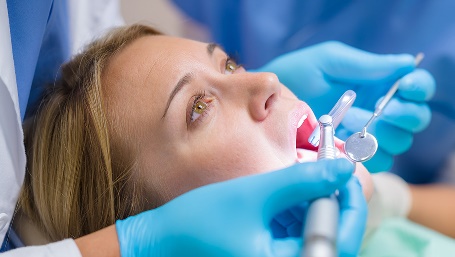
Don't hesitate to visit your doctor!
Pulpitis
As caries progresses, the pathological process affects the pulp - the dental nerve, which leads to the development of pulpitis. The pulp is responsible for the nutrition and innervation of the tooth, and when it becomes inflamed, these processes are disrupted.
The pain of pulpitis is different from the pain caused by caries. Pulpitis is characterized constant pain occurring regardless of food intake. They can be very strong and most often appear at night. Moreover, those whose teeth hurt at night due to pulpitis say that most painkillers in this case are ineffective or provide only a short-term effect. This feature of pain with pulpitis is due to the fact that inflammation of the pulp develops in a confined space - the pulp chamber. Its walls compress the increased volume of the pulp, causing severe pain to the person.
Flux
Pulpitis is not the worst complication of caries, although it often causes tooth loss. Even more serious illness, which can occur against the background of progressive caries, is. With flux, inflammation moves from the tooth beyond its boundaries - into bone tissue and periosteum.
The pain from gumboil is very severe, it is accompanied by swelling of the gums around the tooth, and the cheek often swells. An abscess appears on the gum in the affected area, body temperature rises, difficulty opening the mouth appears, chewing and talking becomes painful. The person has weakness headache. Flux is a purulent inflammation. Delaying to see a doctor is very dangerous!
How to relieve toothache at night?

Painkillers will give the fastest effect.
If your tooth hurts at night, in case of emergency when emergency is required dental care, for example, if flux develops, you should consult a doctor immediately. IN major cities Some private dentists work around the clock, and you can go to the dentist even at night on a day off. If your city doesn't have 24-hour dentistry, call an ambulance.
Pain from caries and pulpitis can be relieved with painkillers, but you need to make an appointment with a doctor in the morning, even if the pain subsides. Dental tissues are not able to repair themselves, so the relief will be temporary. The pain will certainly return and, most likely, with renewed vigor. To eliminate aching toothache caused by pulpitis, moderate or deep caries, you can use the following tips:
- take painkillers in the form of tablets, for example, Paracetamol, Tempalgin, Ketorol or Ketanov;
- Apply a cotton ball moistened to the sore tooth;
- rinse your mouth with a decoction of medicinal herbs such as sage, chamomile, oak bark, yarrow (will only help with pain caused by caries);
- try chewing propolis: take a small piece of bee glue and chew it like chewing gum, you can apply it to the sore tooth;
- as a rinse solution, you can use alcohol diluted in water (2 teaspoons per glass of water);
- For oral baths, you can use strong alcoholic drinks (vodka, cognac, whiskey): take a small sip into your mouth, hold it near the sore tooth for a couple of minutes, and spit it out.
Taking painkillers will give the most pronounced and fastest effect, but as soon as the pill stops working, the problem will recur. Remember that pain medication is a temporary measure that allows you to “tough it out until the morning.” Don't delay visiting the doctor!
Every person has experienced toothache at least once in their life. The nature of toothache can be different, since everyone has their own pain threshold.
Often the pain intensifies at night. In order not to writhe in pain, it doesn’t hurt to know several methods of dealing with it.
Main reasons
The source of pain in the oral cavity is the inflammatory process, which is provoked by pathogenic microorganisms.
They begin to actively multiply, and this eventually leads to caries, swelling or fluxes.
In addition to microorganisms, tooth enamel can be exposed to various aggressive substances, which corrode its surface.
Causes of pain:
- caries;
- flux;
- pulpitis;
- enamel crack;
- poorly filled root canal;
- periodontal disease;
- not completely removed tooth;
- alveolitis;
- increased sensitivity of enamel;
- damage to the root canal wall;
- various dental injuries.
Pregnant women and children are at greatest risk. During pregnancy, the mother shares all the beneficial substances with the baby, so her body experiences a lack of vitamins and microelements.
Children often have to be taken to the dentist, as baby teeth quickly become damaged. negative impact caries.

Physiological and psychological factors
When a tooth aches at night, it is quite difficult to cope with this condition, because sometimes even painkillers do not help. The reasons for this reaction can be both physiological and psychological factors.
Physiological factors:
- At night, a person is in a horizontal position, and this increases blood flow to the jaw and head. A person may feel a pulsation as pressure is placed on the inflammatory tissues of the oral cavity. In addition, nerve endings actively react to this condition.
- Vagus nerve Vagus. Physiologists have proven the fact that in the period from 12 o'clock at night to 5 am the body is most susceptible to various kinds of diseases and inflammatory processes.
The vagus nerve consists of many nerve branches that night period change their tone. It is the vagus nerve that can influence sensitivity to pain.
- Promotion blood pressure at night time. IN evening time even in the body healthy person Pressure may increase, which affects blood flow in the head and jaw.
- Inflammation of the tertiary nerve. People often confuse inflammation of this nerve with toothache, since often the tertiary nerve can cause pulsation in the jaw.
Various ENT diseases will “help” to complement the feeling of soreness in the oral cavity.
Psychological factors appear only in our heads. During the whole day, a person is actively engaged in some kind of work, so he does not have time to concentrate on a sore tooth.
When the body relaxes at night, concentration occurs more actively. We begin to feel pulsation in the oral cavity, soreness, increased sensitivity, etc. The next morning there is a sharp need to stop this torment.
Pulpitis
Pulpitis is a complication of caries that has reached soft tissues. This is one of the most common inflammations, which is characterized by prolonged and severe pain.
It especially increases at night, because pulpitis is formed due to the active proliferation of pathogenic microorganisms.
When pus begins to accumulate in the soft tissue cavity, it simply has nowhere to go. Bacteria multiply even more actively, which leads to even greater inflammation.
Pulpitis can provoke increased body temperature, weakness and nervousness.
Diagnostics

To quickly begin treatment of the inflammatory process in the oral cavity, it is necessary to correctly diagnose the disease.
First of all, patients dental offices undergo a visual examination by a doctor. For more in-depth diagnostics, different equipment is used:
- Radiovisiograph Performs x-rays of the painful area with minimal radiation. This method helps to see a clear picture of the disease.
The doctor can view the resulting images from the radiovisiograph on computer equipment. This method helps to see the extent of the inflammatory process, the complexity of the root canals, the location of the tooth, etc.
- Orthopantomograph is a device that takes overview photographs of the dentition. This method allows the dentist to see the location of the teeth from all sides.
It is often used in the diagnosis of diseases associated with damage to the soft tissues of the jaw and bones. It is also used in the process of correcting bites and prosthetics.
- Apex locator can be called a modern device that helps the dentist see the complexity, depth and length of the root canal.
This helps the specialist to carry out high-quality filling of the canals, for example, in the process of treating caries or pulpitis. The apex locator also facilitates the correct selection of all necessary tools for carrying out manipulations during the filling process.
- Dental camera designed for patients rather than dentists. With its help, the patient will be able to see a clear picture of his oral cavity. With the help of a dental camera, doctors are able to early stages determine the depth of tooth decay with caries.
- A dental microscope contributes to the precision of treatment. It is often used for diagnosis pathological processes in the mouth, at the time of root resection and when removing part of the crown. It helps to enlarge the image 25 times, which is important at the diagnostic stage.
All of the above devices can be called basic. Depending on the complexity, pathologists specialists can use the device computed tomography, panoramic radiography, etc.
Treatment
Toothache can be simply unbearable, so you need to know several methods that can really stop this torment. Take off pain syndrome You can even before visiting the dentist.
First aid

Acute toothache is not a death sentence, because you can fight it. There are several first aid rules in this case:
- Cannot take a horizontal position, as the pain will intensify even more.
- Cannot be applied to the cheek warm heating pad or compress. Heat will increase blood flow, and this will provoke even greater pulsation and inflammation.
- At severe pain It is better to prepare a rinsing solution based on soda and salt. Dissolve 1 teaspoon of each substance in a glass of warm water. The water should not be hot. The substances must completely dissolve. Rinse every 30-40 minutes.
- After rinsing, you can take a painkiller. This could be Tempalgin, Aspirin, Ibuprofen, Analgin. Ketanov is often used to relieve pain, but this drug is too strong and can cause a number of side effects.
- To consolidate the effect, you can put a tampon with a crushed painkiller tablet on the sore tooth. If necessary, you can purchase special dental drops.
You cannot increase the dose of medication; you must take the tablets strictly according to the instructions.
Find out how to quickly relieve toothache from the video.
Local therapy
There are times when taking pills does not give the desired effect, so you can resort to local therapy, such as painkillers gels.
The following drugs are suitable as such drugs:
- Cholisal gel– relieves inflammation, fights microorganisms, relieves pain;
- Anise oil– improves tissue restoration, relieves swelling, helps get rid of pus;
- Metrogil Denta– relieves swelling and inflammation, fights pain somewhat worse than Cholisal;
- Kamistad gel– removes pain, does not cause allergies, reduces swelling of tissues.
The preparations should be applied only to the diseased tooth and the gum around it, exceed permissible frequency and the amount of application of the drug is not allowed.
Taking antibiotics

You can take antibiotics only with a doctor's prescription. Not all groups of drugs can cope with microorganisms that cause the inflammatory process.
Antibiotics help well in the process of treating gumboil, since pus can accumulate in the dental cavity. The doctor will help the pus come out, but there is no guarantee that it will not begin to accumulate again.
Treatment is carried out using:
- Amoxicillin represents an antibiotic broad action, therefore it relieves inflammation well during gumboil and pulpitis. Eliminates staphylococci, coli, streptococci.
Adults can take no more than 6 g of the drug per day. Children can be prescribed this drug only from 12 years of age, taking no more than 500 ml at a time.
- Amoxiclav is a drug that contains clavulonic acid and amoxicillin. Prescribed for treatment infectious inflammation in the oral cavity.
Can be taken by adults for 5 days daily norm– 250 mg. Drink every 8 hours. Important! If not carried out local treatment dentist, then taking antibiotics may be ineffective.
- Lincomycin Available in capsule format, it represents a group of lincosamides. Therapy for an adult can last up to two weeks. Take 3 times a day, 500 ml. For children, the norm is calculated differently. For 1 kg of weight 30-60 ml of the drug.
Folk recipes

Gargling with sage decoction
Ingredients: 20-30 g of dry sage, 250 ml of water, 5-7 drops of fir oil.
Pour water over the dry herb and boil for 5 minutes over low heat. Remove the broth from the stove and strain through cheesecloth.
Add to the finished composition essential oil fir trees Rinse your mouth with a slightly warm broth every 15 minutes. Keep it in your mouth for as long as possible. The pain should subside within 1-1.5 hours.
Essential mixture
Ingredients: 10 drops of fir essential oil, 10 drops of peach oil, 10 drops of sea buckthorn oil.
Mix everything until smooth. If you don’t have peach oil, you can use fish oil.
Apply the oily composition to a cotton swab and apply to the sore tooth. Hold for 30 minutes, and then repeat the procedure for another 30 minutes. Pain should decrease after the first application.
Oregano infusion
Ingredients: 20 g dry oregano, 200 ml water. Pour water over the herb and test for 5 minutes over high heat. Strain the finished broth and cool.
Rinse your mouth every 20 minutes. Oregano relieves inflammation well, reduces pulsation and swelling.
Decoction of wormwood flowers
Ingredients: 2 teaspoons of dried wormwood flowers, 1 glass of water, 10 drops of fir essential oil.
Pour water over the flowers and boil for 10 minutes. Cool the finished broth and strain. When it becomes warm, add essential fir oil.
Mix everything and rinse every 15 minutes until the pain goes away. It should reduce pain after 2-3 rinses.
Melissa infusion
Ingredients: 80-100 g dry lemon balm, 500 ml hot water.
Pour boiling water over the herb and let it brew for 4 hours. The prepared infusion can be rinsed in the mouth, or applied to a tampon to the tooth. The infusion begins to act after 3-4 rinses.
The video details the effective and useless drugs for toothache.
Therapy in dentistry
When the dentist has found out the cause of the pain, he can offer the patient several methods of treating the disease. It all depends on the complexity and severity of the disease.
Often, doctors take the following measures to treat caries:
- administration of local anesthesia;
- cleaning soft tissues that have been exposed to pathogenic microflora;
- mechanical treatment of the cleaned area;
- applying an antiseptic;
- installation of a seal;
- polishing the surface of the filling.

If the situation is more advanced, then the doctor may remove the nerve for treatment. It all depends on the complexity of the disease.
Other procedures are performed to treat pulpitis:
- administration of anesthesia;
- removal of affected tissue;
- tooth opening;
- removal of damaged pulp;
- re-treatment of root canals;
- applying an antiseptic;
- installation of fillings in the canal;
- installation of a seal.
If periodontitis is being treated, then removal of pus and prescribing a course of antibiotics are added to this list of processes.
Prevention
To keep your teeth healthy and less exposed to caries, you need to follow just a few rules:
- Visit your dentist every 6 months.
- Conduct professional ultrasonic cleaning oral cavity every 4-5 months.
- Polish teeth with abrasive pastes.
- Conduct deep fluoridation of enamel with fluoride-containing preparations in a bioavailable form.
- Brush your teeth at least twice a day for at least 3 minutes.
- Use mouthwash.
- Clean with dental floss.
- Consume more foods containing calcium, B vitamins, vitamin A, C.
- Change toothbrush every 3 months.



